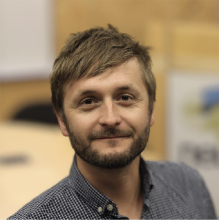New HBHL Research Theme 3 Leader: Madeleine Sharp
We're happy to announce Madeleine Sharp as the new Leader of Healthy Brains, Healthy Lives (HBHL) Research Theme 3: Applied Cognitive Neuroscience of Brain Plasticity.

Register today for the first edition of Innovation and Entrepreneurship for Researchers
We are happy to announce that the first edition of the Entrepreneurship and Innovation for Researchers, Ideas to Impact, will be held in Montreal on October 18, 2023! This event has been organized with the support of our partners the Desjardins Centre for Advanced Training (DCAT).
Congratulations to the recipients of the 2023 HBHL Fellowships!
This year's edition of the HBHL Graduate Student and Postdoctoral Fellowships Program has recognized the dedication and promise of 37 exceptional students. Master's students are awarded $10,000, while those pursuing their PhDs receive $15,000, providing crucial support for their research endeavors throughout the upcoming year.
The NeuroSphere Entrepreneurship Workshops are back
The NeuroShere Entrepreneurship Bootcamp is back in the form of a 3-week workshop series!

HBHL Symposium 2023: advancing neuroscience research with over 300 attendees
Over 300 attendees gathered on May 4th and 5th at the McGill University Centre for the HBHL Symposium 2023, a two-day event dedicated to the latest advances in neuroscience and brain health. Renowned keynote speakers, such as Liisa Galea, Richard Bethlehem, Mark Cembrowski, and Gemma Modinos, captivated the audience with their insights on the cutting-edge research happening in the field.
Available Position: Program Officer
Application deadline: April 8, 2023 View the complete posting and apply today.
Join the HBHL/NeuroSphere team!
Position Summary:
Available Position: Policy & Knowledge Exchange Officer
Application deadline: April 9, 2023 View the complete posting and apply today.
Join the HBHL team!
Position Summary:
Unraveling the mysteries of brain plasticity
Have you ever wondered what happens inside someone’s brain when they’re learning how to play a musical instrument or how to ride a bike?

IMPRESS Paid Indigenous Mentorship Program is back!
HBHL is partnering again with McGill’s Branches on the 2023 edition of the Indigenous Mentorship and Paid Research Experience for Summer Students (IMPRESS) program.

New HBHL Research Theme 1 Associate Leader: Boris Bernhardt
We're happy to announce Boris Bernhardt as the new Associate Leader of Healthy Brains, Healthy Lives (HBHL) Research Theme 1: Neuroinformatics and Computational Modeling.
HBHL's Research Theme 1 Associate Leader plays an essential role in HBHL’s governance and decision-making structure. They also provide input to HBHL's strategic direction, including the development of funding initiatives and activities aimed at reaching HBHL’s goals.

Researchers classify Alzheimer’s progression and subtypes for a personalized approach to the disease
Alzheimer’s disease is a disorder characterized by abnormalities in several different biological areas.

Mapping neurotransmitter systems to the structural and functional organization of the brain
Neurotransmitters are chemicals brain cells use to communicate. They work together with matching receptors on the cell surface to drive brain activity. However, we don’t fully understand how the distribution of these receptors varies region by region throughout the brain, nor what effect they have on brain function.

Call for Summer 2023 IMPRESS supervisors is now open
HBHL is partnering with McGill’s Branches initiative on a second round of the extremely successful


